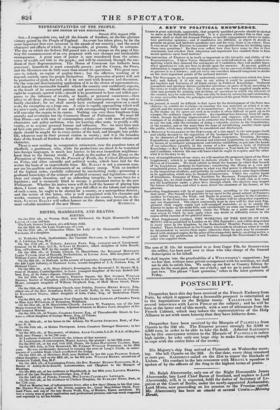REPRESENTATIVES OF THE PEOPLE.
TO THE EDITOR OF THE SPECTATOR.
Stroud, 27th August 1832.
SIM—I Congratulate you, and all the friends of freedom, on the late glorious
:victory` gained by the People of England. An event has taken place, by far the i
most important that ever occurred n the annals of our counbry • and the moral character and effects of which, it is impossible, at present, fully to estimate. -The day on which the Reform Bill passed into a law, stamps on the page of his-
tory the commencement of an wra pregnant with vast changes and incalculable .consequences. A great mass of power is now transferred from the aristo- cracy of wealth and title to the people ; and will be exercised, through the me- dium of their Representatives. The House of Commons has hitherto been governed; henceforth it must essentially govern ; and the Crown, the Peers, and the Ministers can do little more than second its operations. This great mea-
sure is' indeed, an engine of mighty force ; but the effective working of it depends entirely upon the people themselves. The possession of power will not he productive of good, but evil, if it be not used with firmness and discretion. On the wise and discriminating application of it in the choice of representatives, will depend the inestimable benefits which the country now confidently expects, as the result of its unwearied patience and perseverance. Should the elective right be wantonly sported with—should it be prostituted to base and selfish pur- poses, to the influence of wealth, or family, or personal connexions—then adieu to all those pleasing hopes and delightful anticipations so long and so fondly cherished ; for we shall merely have exchanged corruption on a small scale, for corruption on a large one. A crisis is rapidly approaching which will try men's souls, and which, if not met with corresponding wisdom and energy, will convulse the empire to its centre. Nothing can save these kingdoms from anarchy and revolution but the Commons House of Parliament. We must fill that House—not with men of commonplace minds—not with men of ordinary characters and paltry ambition, who are hunting after seats, to gratify a silly vanity, or to acquire personal honour and influence. No: we must have men of first-rate powers—of spotless integrity—of dauntless courage. Such indivi- duals should be sought for in every corner of the land, and brought into public life, whatever may be their present station in society; and it is the bounden duty of the friends of freedom to draw the national attention to their talents and character.
There is now residing in comparative retirement, near the populous town of Sheffield, a gentleman, who, while his productions are about to be translated into foreign languages, is much less known in his own immediate neighbour- hood than to the literary world. I allude to the author of the Essay on the Formation of Opinions, On the Pursuit of Truth, the Critical Dissertation on Value, and other scientific and political works, which have laid for the writer the basis of an imperishable fame. Mr. BAILEY is not a common man, nor are his qualities and attainments of an ordinary stamp. With an intellect of the highest order, carefully cultivated by unremitting study—possessing a profound knowledge of the sciences of political economy and legislation—with a clear and simple elocution, and an unbending integrity, he seems born for a legislator ; and is eminently fitted to occupy a prominent station in the new Parliament. Whether his native town will do itself the honour of placing him there, I know not. But in order to give full effect to the talents and energies of such a man, he ought to be elected for a county, or a metropolitan district ; and the writer of this letter, who is well acquainted with his character and works, ventures to predict, that, whether elected for county, borough, or dis- trict, SAMUEL BAILEY will reflect honour on the choice, and prove one of the most valuable members of the new House. R CSTIC US.


























 Previous page
Previous page